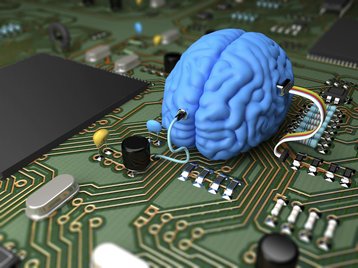When cloud became available in its current form - as service stacks provided at scale from specially designed data centers with almost infinite capacity - the IT department began its pivot to becoming an internal, digital services provider with all the related advantages for transparency, agility and cost control. This shift is continuing and even accelerating with different multi-cloud options available for specific workload or vertical market requirements.
Yet because the cloud levels the playing field for all it makes it hard to find competitive advantage by using what is basically becoming commoditized infrastructure. The business challenge is using the availability of cloud infrastructure more intelligently. Cloud advantages rest in new opportunities from the latest artificial intelligence and machine learning technologies.
Intelligence needs extreme technology brains
It has been said that data is dumb and plentiful, but intelligence is rare and precious. More importantly, with fresh data being generated at a fast pace over time, the intelligence from data becomes even harder to capture in timely manner.
Today, as before, data is the raw material for intelligent business decision making. What’s changed is that the issues of poor access to real time data and poor data quality have been addressed.
New digital landscapes such as smart cities and intelligent buildings are making more and more data readily available. Increasingly this will be generated and arrive in the cloud in real time.
In parallel, AI and machine learning models, which need vast amounts of data to be effective, are becoming smarter at identifying usable data. AI models need scale up capacity for capture, ingestion and analyzing of data. But they also need to be trained properly.
To extract intelligence to direct the correct business actions requires a combination of domain expertise, technologies for data aggregation, convergence and deployment, the right AI and machine learning training models, and the right methodologies.
Intelligent data
Every sector is changing in response to new data. Retailers are harvesting online and in-store consumer data in real time to merge digital and physical interactions to make shopping a personal experience. Think about smart shelves, AR and VR experiences for the shopper and supply chain optimization and same day delivery at the back end.
Financial services firms are using real-time data to generate a single customer view. Broadcast, Media and Entertainment, along with Telcos, are using real time data to provide customized services and targeted content.
Manufacturing and agriculture
There are few things more important than food supply. Yet despite mechanization, agriculture as an industry hasn’t fundamentally changed for hundreds of years because the intelligence has been locked up in the heads of the producers. Now with sensor data measuring moisture, nitrogen levels and monitoring environmental conditions such as pests and weather, crops can be fed, watered and protected for optimum growth and harvested at exactly the right time for optimum yield. This is done using intelligent data.
Another prime example of intelligence being applied from the proper capture and analyzing of data is in manufacture.
Manufacturers constantly strive to cut costs and increase productivity by streamlining processes from the supply chain through production to delivery.
Now with digital descriptions of the manufacturing processes, one can use the real-time data being generated across the supply chain from raw material producers to parts production, from logistics for just-in-time delivery to capturing machine sensor data (Industrial IoT) within the factory to drive lean production.
Benefits include adjusting production output in response to environmental or market conditions, streamlining advanced factory production line operations and infrastructure management. Everything from predictive maintenance on factory plant to cutting energy costs to inventory control right out to accurate sales forecast predictions can be achieved using intelligent data.
The combination of low-cost access to cloud infrastructure, the continued boom in data generation and consumption and AI and machine learning platforms which will become ever smarter are reshaping all businesses and industries. With the right approach companies can begin to use intelligent data to make faster and smarter decisions.





